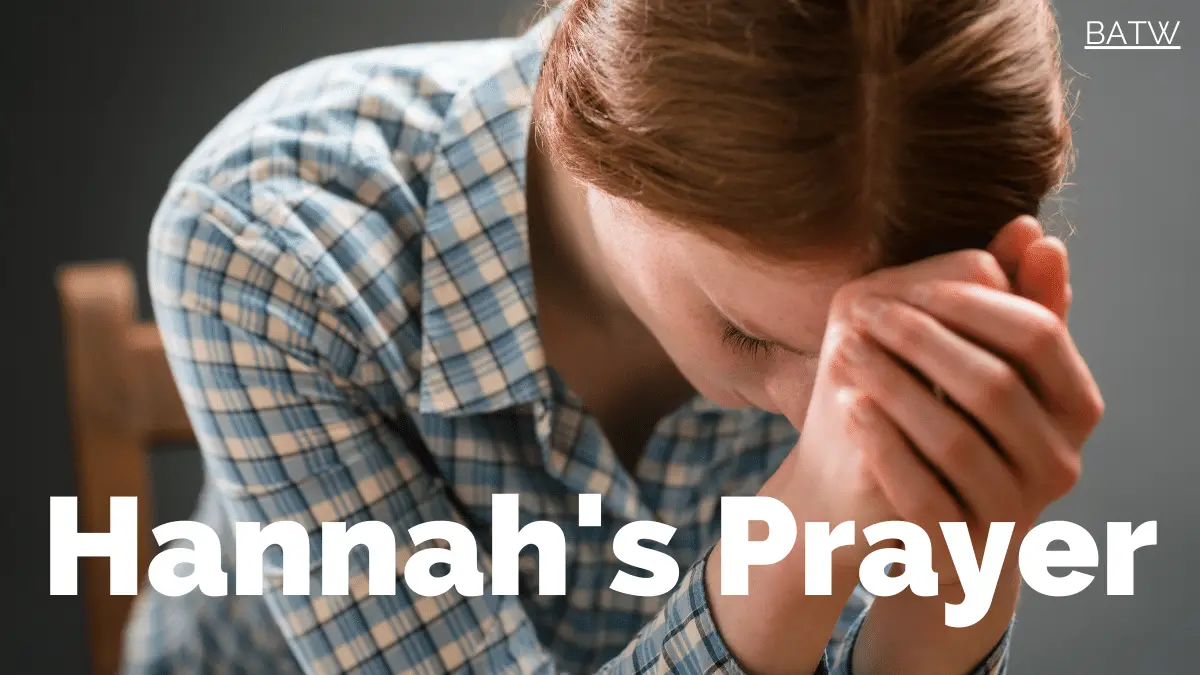What Was Different About Hannah’s Prayer of Supplication?
Samuel records Hannah’s prayer of supplication in 1 Samuel 1:1-28. She prays two prayers. First, she makes a prayer of supplication, then she prays a prayer of praise.
Today, I will explore the lessons we could learn from Hannah’s Prayer of Supplication. But at a later date, if the Lord is willing, I shall also investigate the lessons from her other prayer.
In this respect, let’s observe her behavior in three areas as she prays. These include her emotions; vow, and her manner of praying.
Watch the video for this Bible Study here.
Hannah’s Emotional State
Hannah was an emotional wreck! She was barren and had no children, so Peninnah, her husband’s other wife, “her adversary”, teased and “provoked her” excessively year after year (1 Samuel 1:5-6).
As a result, the former “fret”, “wept and did not eat” (v7).
As I explained in a previous Bible Study, a prayer of supplication, is not a petition that we make every day.
Hannah didn’t pray her prayer of supplication daily either. Instead, even though annually her adversary would taunt her she did not pray about her situation.
But, one year her provocation climaxed at a very high point with grief, and she decided she has had enough.
Therefore, she decided to pray about it.
At that point, she decided that she was not going to endure another year of provoking, weeping, not eating, fretting, and grieving.
She was stressed but she came to the conclusion that the Lord God had to intervene.
Consequently, Hannah realized that to change her situation she had to do something differently.
So, she introduced “a vow” to the Lord God (1 Samuel 1:11).
What’s a Vow to the Lord God?
In order that we are all on the same page regarding a vow, let’s define it.
A vow is either an audible or inaudible promise to a cause; to someone or to the Lord God (Numbers 6:2; Acts 21:23).
“If a man vow a vow unto the Lord, or swear an oath to bind his soul with a bond; he shall not break his word, he shall do according to all that proceedeth out of his mouth” (Numbers 30:2).
Consequently, observe that the Bible uses these phrases “saying” or “and said” as many people make vows, (Genesis 28:20; 1 Samuel 1:11).
On most occasions, when we make a vow to another person it maybe audible.
However, when we make a promise to the Lord God it could either be audible or silent for the Lord sees and knows our hearts.
The latter instance was the case of Hannah for she vowed in her heart to the Lord God (1 Samuel 1:12-13).
Three Examples of People Who Made Vows
The first person who comes to my mind is Jacob. Then, there is Jephthah, and finally, Apostle Paul.
- Jacob’s Vow (Genesis 28:20-22).
- Jephthah’s Vow (Judges 11:30-31).
- Apostle Paul’s Vow (Acts 18:18).
Did The Vow Impact Hannah’s Prayer of Supplication?
So, every year Peninnah would tease Hannah until the latter was an emotional wreck.
Listen as her husband attempts to console her. He says, “Hannah, why weepest thou[;] and why eatest thou not [;] and why is thy heart grieved? [A]m not I better to thee than ten sons?” (1 Samuel 1:8).
So, one year, she decided to change her situation. She has had enough! Therefore, she makes an oath to the Lord God.
She makes a conditional promise to Him. She says, Lord if you will see my affliction; remember me; give me a baby boy; then, I promise to give him back to you and he will be separated to your service all his life (1 Samuel 1:11).
Note The Manner of Hannah’s Prayer of Supplication
Hannah didn’t write her prayer and she didn’t read one that someone wrote for her. Her petition came from her heart.
Hannah’s prayer of supplication wasn’t one she made every year but only when her heart was full.
Even though annually Peninnah provoked her to tears.
Consequently, a supplication prayer is most effective when our hearts are full!
For that reason, Hannah waited until her soul was grieved, or she was “in bitterness of soul”, then she made her petition to the Lord God (1 Samuel 1:10).
Additionally, note the manner of her prayer. As she prayed, she “wept sore”, and she “poured out her soul before the Lord” (1 Samuel 1:10, 15).
She was crying as she poured out her heart to the Lord. We cant pour out our hearts to God by reading and by reading literature that someone else wrote!
However, to further emphasize the fact that Hannah’s prayer of supplication was one with great emotions, listen further as she explains to the priest.
She reveals to Eli, “for out of the abundance of my complaint and grief have I” prayed to the Lord (1 Samuel 1:16).
If she had never gotten to that place, she wouldn’t have made a prayer of supplication.
Conclusion
What Lessons we Learned From Hannah’s Prayer of Supplication?
Hannah couldn’t make an effective supplication prayer without petitions. She didn’t read her prayer. She pour it out from her heart before God.
Every effective prayer of supplication must include a least one petition or request.
A prayer of supplication is not always done for someone else for sometimes we make requests to God for ourselves.
Because these are prayers people make when they have problems that only God can solve.
Hannah realized that even though her heart was full and her emotions were rife those were inadequate by themselves to change her situation.
However, to make her petition unique and to move the hand of the Lord God, on her behalf, she introduced a vow.
She knows that vows that emanate from sorrowful spirits attract the Lord.
Both Israel and Jephthah realized this, thus they all included a vow in their prayers to the Lord to move His hand in their favor.
They move His hands in our favor.
Next Time You Pray Do This!
Consequently, her supplication prayer comprised of three petitions to the Lord and two inextricable vows.
Finally, these she made with great emotions to the Lord God, who answered her prayer.
In closing, from Hannah’s prayer of supplication we learn that our current emotions play a vital role in our supplications.
And for that reason, we don’t make them every day but only when our situations require them.
Next, as you make your prayer of supplication introduce an appropriate vow to God.
This must come from your heart and one you fully intend to keep.
It carries adverse consequences for you if you vow a vow to God and fail to keep or honor it!


